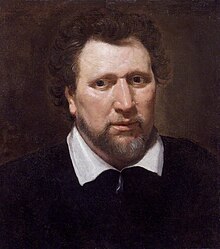Author:Ben Jonson
Appearance
(Redirected from Author:Benjamin Jonson)
Works
[edit]- The Works of Ben Jonson, ed. William Gifford (1819) (transcription volumes: 1, 2, 3, 4, 5, 6, 7, 8, 9)
Essays
[edit]Plays
[edit]- A Tale of a Tub
- The Case Is Altered
- Every Man in His Humour (transcription project)
- Every Man out of His Humour
- Cynthia's Revels
- The Poetaster
- Sejanus His Fall
- Eastward Ho
- Volpone, or The Fox (transcription project)
- Epicoene, or The Silent Woman
- The Alchemist
- Catiline His Conspiracy
- Bartholmew Fayre (respelled - Bartholomew Fair)
- The Devil is an Ass
- The Staple of News
- The New Inn, or The Light Heart
- The Magnetic Lady, or Humors Reconciled
- The Sad Shepherd
- Mortimer his Fall
- The Coronation Triumph, or The King's Entertainment
- A Private Entertainment of the King and Queen on May-Day
- The Entertainment of the Queen and Prince Henry at Althorp
- The Masque of Blackness
- Hymenaei
- The Entertainment of the Kings of Great Britain and Denmark
- The Masque of Beauty
- The Masque of Queens
- The Hue and Cry after Cupid, or The Masque at Lord Haddington's Marriage
- The Lady of the Lake, or The Speeches at Prince Henry's Barriers
- Oberon, the Faery Prince
- Love Freed from Ignorance and Folly
- Love Restored
- A Challenge at Tilt, at a Marriage
- The Irish Masque at Court
- Mercury Vindicated from the Alchemists
- The Golden Age Restored
- Christmas, His Masque
- The Vision of Delight
- Lovers Made Men, or The Masque of Lethe, or The Masque at Lord Hay's
- Pleasure Reconciled to Virtue
- For the Honour of Wales
- News from the New World Discovered in the Moon
- The Entertainment at Blackfriars, or The Newcastle Entertainment
- Pan's Anniversary, or The Shepherd's Holy-Day
- The Gypsies Metamorphosed
- The Masque of Augurs
- Time Vindicated to Himself and to His Honours
- Neptune's Triumph for the Return of Albion
- The Masque of Owls at Kenilworth
- The Fortunate Isles and Their Union
- Love's Triumph Through Callipolis
- Chloridia: Rites to Chloris and Her Nymphs
- The King's Entertainment at Welbeck in Nottinghamshire
- Love's Welcome at Bolsover
Poetry
[edit]- An Elegy
- Epitaph on Elizabeth L. H.
- Epode
- A Farewell to the World
- His Supposed Mistress
- The Hourglass
- A Hymn on the Nativity of My Saviour
- Hymn to Diana
- On Lucy, Countess of Bedford
- On My First Sonne
- The Noble Balm
- The Noble Nature
- A Nymph’s Passion
- An Ode to Himself
- On a Robbery
- On Poet-Ape (1612)
- On Salathiel Pavy
- The Shadow
- Simplex Munditiis (also known as Clerimont's Song)
- To Celia (later set to music as "Drink to Me Only with Thine Eyes")
- To Censorious Courtling
- To Doctor Empiric
- To Fine Lady Would-Be
- To the Immortal Memory of Sir Lucius Cary and Sir Henry Morison
- To the Memory of My Beloved the Author, Mr. William Shakespeare and What He Hath Left Us
- The Triumph
- That Women are but Men's Shadows
Other works
[edit]- Epigrams (1612)
- The Forest (1616)
- A Discourse of Love (1618)
- Argenis (1623, as translator)
- The Execration against Vulcan (1640)
- Ars Poetica, or Horace's Art of Poetry (1640, as translator)
- The English Grammar (1640)
- Underwoods (1640)
- Timber, or Discoveries
Works about Jonson
[edit]- "Ben Jonson", in The Lives of the Poets-Laureate, by W. S. Austin and J. Ralph (1853)
- "Jonson, Ben," by Adolphus William Ward in Encyclopædia Britannica, Ninth Edition (v. 13) (1881)
- "Ben Jonson" (1882), a sonnet by Algernon Charles Swinburne
- "Jonson, Benjamin," in Dictionary of National Biography, 1885-1900, London: Smith, Elder, & Co. (1885–1900) in 63 vols.
- A Study of Ben Jonson (1889), by Algernon Charles Swinburne
- Ben Jonson's Comedy of Bartholomew Fair by Lillian Moller Gilbreth (1902)
- "Jonson, Ben or Benjamin," in A Short Biographical Dictionary of English Literature, by John William Cousin, London: J. M. Dent & Sons (1910)
- "Jonson, Ben," in Encyclopædia Britannica (11th ed., 1911)
- "Ben Jonson", in The Sacred Wood: Essays on Poetry and Criticism (1920), by T.S. Eliot
![]()
Some or all works by this author were published before January 1, 1930, and are in the public domain worldwide because the author died at least 100 years ago. Translations or editions published later may be copyrighted. Posthumous works may be copyrighted based on how long they have been published in certain countries and areas.
Public domainPublic domainfalsefalse

